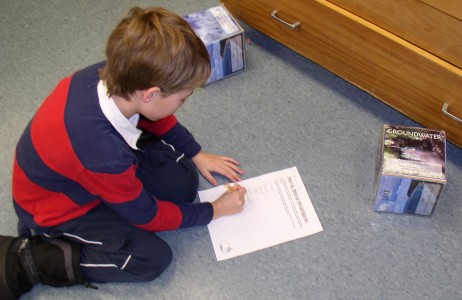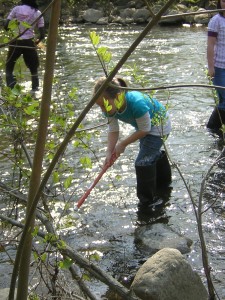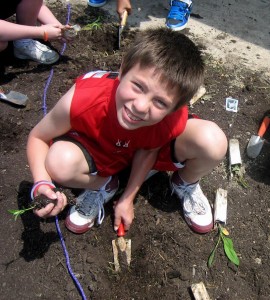Leslie Science and Nature Center is sponsor, partner
Related story below: Wolf Family Foundation and the LSNC teams with 3 Ann Arbor schools each year on student-driven projects
By Casey Hans
AAPSNews Service
Take one measure of science and mix well with writing. Add a hands-on activity and you have a class full of after-school fun.
It’s all part of the Leslie Science and Nature Center After-School Writing Club at Carpenter Elementary School, where students are excited about learning, thanks to a partnership with the center. Up to 20 students participate in the club, which brings students in grades three to five together once each week.

“I enjoy this so much – I just love my kids,” said Lauren LaRocca who coordinates the club with Jessie Maxwell. Both are program coordinators for the Leslie Center.
Maxwell said the program has been well received. “It increases their aptitude for science, which is one of their long-term goals,” she said.
This is the club’s fourth year at Carpenter and Principal Ron Collins said students are invited to participate in the fall through recommendations from teachers who think students will benefit from the writing exercises and science units. Many of the projects blend with the school’s curriculum units.
“This enables us to attack science and writing at the same time,” Collins said. “It gives them an area of interest that they want to write about. A lot of it carries on afterward.”
Collins said his school first got involved with the Leslie Science and Nature Center after experiencing programs at the school funded through the Wolf Family Foundation. These included planting a wildflower garden in front of the building and doing water sampling.
At one recent after-school club session, students were pretending to be human versions of water droplets as they moved from one form of water to another through stations set up in the classroom: rain, clouds, river, glaciers, oceans or lakes, soil, groundwater and plants. Students then had an assignment to write about their experience and shared their findings with classmates.
Part of the lesson included water evaporating into the clouds and how it comes back to Earth. “ … And then the clouds picked me up again and I went into the ocean,” explained one student in his narrative.
Other Ann Arbor schools also partner with the LSNC in a variety of ways. At Northside Elementary, the center helps with a weekly writing program and there is a weekly science program at Pittsfield Elementary. At Wines Elementary, there is an after-school geo-caching club and Burns Park Elementary partners with the center for a Discover Nature Night each April, where students enjoy hands-on activities and live animal presentations.
Family foundation and LSNC teams with 3 elementaries on student-driven projects
Carpenter Elementary is one of three schools in the district that is touched each year by the Wolf Family Foundation through the Leslie Science and Nature Center’s in-school program for students in grades 3-5. Northside and King also benefit from the program thanks to a substantial grant that the family funds each year.

The foundation is based in Ohio, but family members are encouraged to do community service wherever they live – and grants are awarded based on that service. They fund projects all over the world.
In Ann Arbor, parent and retired physical education teacher Jody Linn first became involved with the Leslie Center as a liaison for the Ann Arbor Public Schools Community Education and Recreation Department. Her interest carried over to service on the Leslie Center board, where she subsequently saw the benefit of having the center partner with the school district.
“I thought about my passion – and that’s kids,” said Linn, about why she got involved and proposed the programs for the Leslie Center. “I wanted to find a way to create an ‘aha’ moment. I like the Leslie Science and Nature Center because it’s a hands-on learning experience. You involve the teachers, build it into the curriculum and make it interdisciplinary.”
Linn said she is pleased to see the center creating a bond with students and teachers and believes the program has raised environmental awareness and built an interest in science.
The programs started with a $5,000 grant, which has expanded to about $10,000 each year. Money is funneled through the Leslie Center and benefits Ann Arbor students directly.
Each year, participating students do a culminating activity that they design as part of the Wolf Family Foundation-funded program. The program has funded such activities as river testing, analyzing the health of rivers and creating rain gardens, among others.

Some of the most recent projects include: designing reusable water bottles and pins to promote water conservation at Carpenter, an annual Earth Day celebration at King Elementary and a river cleanup day at Northside Elementary. In previous years, Northside made videos for the Millers Creek Film Festival and created books for their reading buddies and Carpenter created “Save our River” T-shirts and planted a native plant garden outside of the school.
“Students get the interactive experience for three years in a row,” said Amanda Lodge, education director for the Leslie center who coordinates the programs with Linn. “It builds these connections with their schools.”
The program currently touches 40 classrooms and between 500-600 students each year, and most of those students are involved with the program over multiple years.
Linn said she is happy to continue recommending the program each year, and is always looking for ways to work with the LSNC staff to make them better. “We’re reviewing the program. How do we pay it forward?” she said. “How do we reach out beyond where we are now?”

